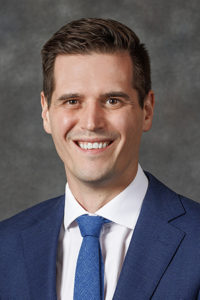Behavioral health provider bill expanded, advanced

A measure that would establish new requirements for behavioral health contract service providers was broadened and given first-round approval April 2.
LB380, as introduced by Sen. John Fredrickson of Omaha, would add requirements for the state Department of Health and Human Services and place restrictions on contractors through the state’s managed care organizations.
Fredrickson said his office has heard from behavioral health providers from across the state about their experiences with Nebraska’s managed care organizations.
“Throughout discussions with these providers, it became clear that there are areas of statutes covering these MCOs that need to be addressed to increase transparency, make clear what is to be included in their contracts and bolster taxpayer confidence in one of state’s largest [budget] line items,” he said.
Fredrickson said the Legislature needs to provide clearer expectations to both DHHS and MCOs to serve Nebraskans efficiently and effectively.
LB380 would require the DHHS Division of Medicaid and Long-Term Care to define network adequacy and contractor compliance with federal and state laws for coverage of mental health and substance use disorders. It also would require:
• public access to all surveys, financial analyses, contract audits and parity reports prepared by a contractor;
• access to mental health and substance use disorder providers through regulation, network adequacy and provider rate adequacy;
• establishment of a monthly electronic communication system with all Medicaid providers and communication of any change in contracts with managed care organizations; and
• annual posting on the DHHS website of criteria that the division uses to assess network adequacy of each MCO.
Fredrickson said the changes impacting MCOs would ensure that mental health and substance use treatment services have parity with physical health services and that MCOs meet generally recognized standards of care.
Under the bill as introduced, managed care organizations would be:
• prohibited from reducing rates lower than those published by DHHS;
• prohibited from limiting mental health and substance use disorder coverage more than other conditions;
• required to maintain adequate provider networks for mental health and substance use disorder services;
• required to utilize generally recognized standards of care criteria and make utilization review policies public; and
• prohibited from revoking authorization for mental health and substance use disorder services after a provider renders such service.
A Health and Human Services Committee amendment, adopted 25-0, would strike the requirement that a contractor may not reduce department posted Medicaid rates. It also would add amended provisions of LB381, also introduced by Fredrickson, which seeks to improve transparency and oversight in Nebraska’s Medicaid auditing system.
Fredrickson said changes to the process are needed to protect providers from “predatory” audits that can involve clawing back tens of thousands of dollars for services that were legitimately provided. The current auditing system has caused many providers to stop accepting Medicaid patients, he said.
Among other provisions, the amendment would require program integrity contractors to provide clear justification for an audit and provide an appeals process. It also would limit review of claims to within three years from the date of payment and limit record requests to relevant documents proportional to the services being audited.
The amendment also would prohibit recovery of overpayments before all appeals are exhausted except in cases involving a credible allegation of fraud.
Sen. Eliot Bostar of Lincoln offered an amendment to add provisions of his LB610 to the proposal. Those amended provisions would allow DHHS to seek federal approval for implementation of the Ground Emergency Medical Transport Act.
Under the amendment, the department would be allowed to distribute the supplemental reimbursement to eligible providers under a payment method based on ground emergency medical transport services. The supplemental reimbursement could not exceed the amount of financial participation received as a result of the claims submitted.
Bostar said Medicare and Medicaid don’t cover the full cost of providing advanced life support transport and that the cost of those services has increased substantially in recent years while utilization has remained stable.
The amendment would provide a “measurable increase” in the Medicaid reimbursement rate, he said, to ensure that advanced life support transport providers can financially maintain service levels in the coming years.
After voting 26-0 to adopt the Bostar amendment, lawmakers advanced LB380 to select file 32-0.


